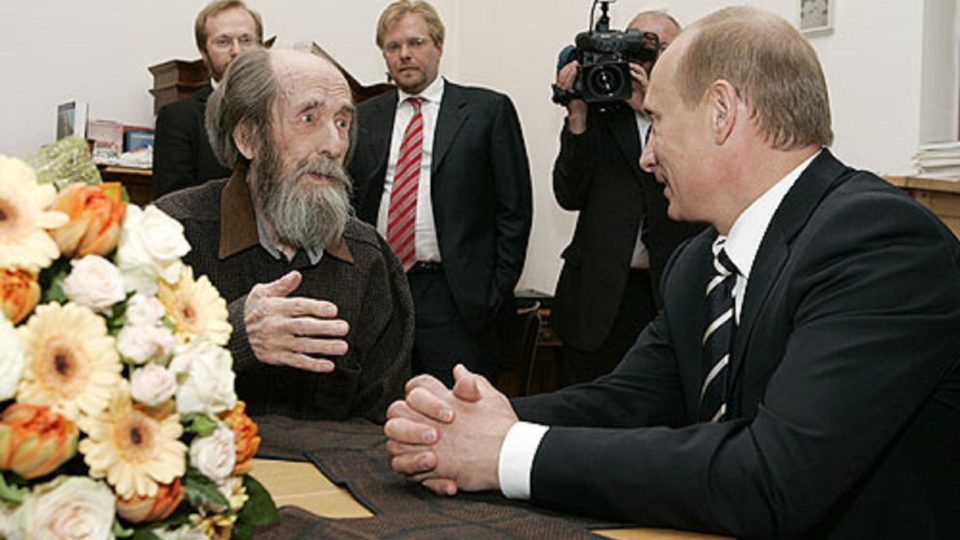
Alexander Solzhenitsyn was many things. A fearless defender of freedom in an age of totalitarianism. A fearless critic of the hedonistic contemporary West. A great historian. A great novelist. A Nobel Prize winner. A prophet.
As for his ability to foresee things, Solzhenitsyn prophesied, at the height of the Soviet Union’s power, that he would live to see the regime fall and return to his native Russia. As with all prophets, he was not taken seriously. All the “experts” were saying that the Soviet empire was here to stay and would be part of the world’s geopolitical scene forever. As history has shown, the prophet was right; the experts don’t.
Of course Solzhenitsyn is worth taking seriously. This is especially clear in his anticipation of the current crisis in Ukraine*.
Still in 960, during the writing process of the novel that would later be published under the title “Gulag Archipelago”, he wrote that he feared a conflict between Russia and Ukraine in the future: “It pains me to write this, as Russia and Ukraine are mixed in my blood, in my heart and in my thoughts. But my experience with Ukrainian friends in the labor camps has shown me that they harbor a lot of resentment. Our generation will still have to pay for the mistakes of our parents.” ) Anticipating the rise of nationalism and its territorial ambitions, Solzhenitsyn lamented that it was much easier to “put your foot down and shout ‘this is mine!’” than to seek conciliation and coexistence. Surprising as it may be, the Marxist idea that nationalism is losing steam is not true. On the contrary, in an era of nuclear and cybernetic research, for some reason nationalism gains strength. And like it or not, the time is coming for us to honor the promissory notes of self-determination and independence; that we do it for ourselves instead of waiting for the beheading. We have to prove that proving that we are a great nation not because of the vastness of our territory or the number of people in our care, but because of the greatness of our values.
Russia should to be content to “cultivate the land we have left after these places that don’t want to stay with us part.” In the case of Ukraine, Solzhenitsyn predicted that “the situation will be very painful”. It was necessary, however, that the Russians “understand the tension level” of the Ukrainians. Many years later, in April of 1990, Solzhenitsyn wrote a letter to the Toronto Conference, which dealt with relations between Russia and Ukraine. In the letter, he wrote that “the Russian-Ukrainian problem is one of the main ones of our time and is fundamental for our peoples”. The problem, however, was exacerbated by “overwhelming passion and the resulting blistering temperature”: “I have said it over and over again, and I am reiterating it here and now, that no one can be stopped by force; adversaries must never resort to coercion against the other side or their own people or a minority, since every minority contains within itself a minority of its own.”
Following the principles of subsidiarity that had always spurred his political reasoning, Solzhenitsyn insisted on the right of communities to determine their own destiny, without the coercive force of a central government. strange, be it from Moscow or Kiev. “In all cases, community input must be identified and implemented. Therefore, all problems can only be solved by the local population (…)”. Meanwhile, the “uncompromising bigotry” that spurs extremists on both sides of the ethnic divide would be “fatal to both nations and beneficial only to their enemies.” In 1990, in the masterpiece “Rebuilding Russia” , Solzhenitsyn prophesied the danger inherent in Ukraine’s ethical makeup: “Separating Ukraine today means dividing millions of families and people: think of how mixed-race the population is; there are entire regions of predominantly Russian population; many people there find it difficult to choose their own nationality; many people are of mixed origin; think about how many mixed-race marriages there are (by the way, until now no one thought of these marriages as mixed-race)”. Although Solzhenitsyn feared the consequences of an independent Ukraine, he respected the right of the Ukrainian people to secede: right that was exercised after the Soviet Union collapsed. Reiterating his principles of subsidiarity, he insisted once again that “only the local population (…) can decide the fate of their community or region, while each of the ethnic minorities in that locality must be treated without violence”. Today, nearly six years after his death*, Solzhenitsyn’s position is the only sensible and safe solution to the Ukrainian crisis. Regions to the east of Ukraine and wishing to separate from the western part of the country should be able to do so. In fact, Ukraine already comprises two nations. It makes sense, therefore, that this reality is in fact reach the prestige of a reality de jure . Any other solution is not only unfair but will lead to even greater injustice in the form of war, terrorism and hatred. In this, as in many other matters, the voice of the prophet should be heard.
Joseph Pearce is a contributor to the Imaginative Conservative, editorial director of the Augustine Institute, publisher of St. Austin Review and author of several books.
17121620©2014 Imaginative Conservative. Published with permission. Original in English


